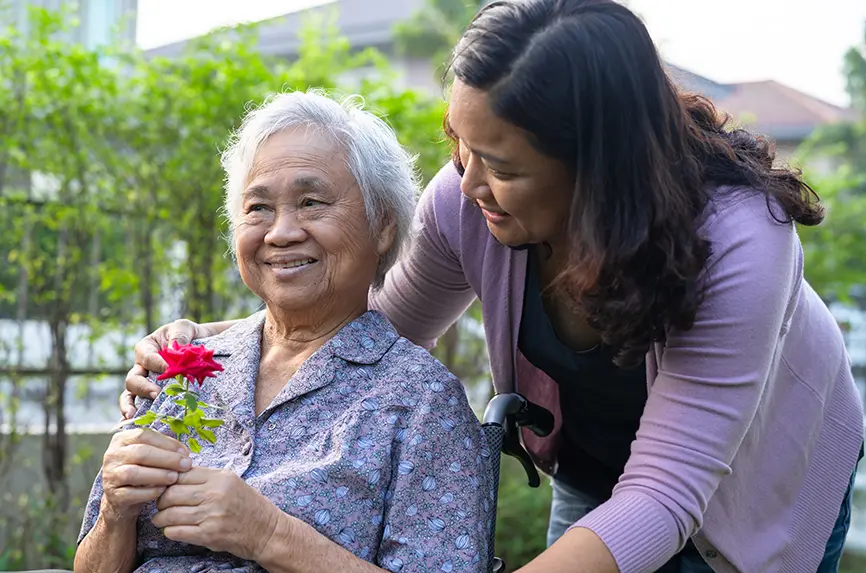Hastings Center News
Special Report: Living with Dementia
To experience or even contemplate dementia raises some of the most profound questions in bioethics and humanities: What does it mean to be a person? How does someone find meaning in life while facing progressive neurological deterioration? What do health care providers, or residents of a neighborhood, or citizens of aging societies, owe to people living with dementia, and why? And how do shared ideas and values – narratives – that circulate within societies and groups shape the experience of living with dementia, for better or worse?
To improve the lives of our fellow citizens who are living with dementia or providing dementia care, all of us need to pay attention to how we imagine and talk about these interwoven and increasingly common experiences, concludes Living with Dementia: Learning from Cultural Narratives in Aging Societies, a special report published by The Hastings Center for Bioethics.
This report responds to calls from health care and social service practitioners for new ways to depict and talk about dementia, a collective term for Alzheimer disease and related dementias. These aging-associated, progressively debilitating, ultimately terminal conditions affect a person’s thought, memory, speech, and behavior and require increasing levels of hands-on care. The report notes that over 7 million people are living with dementia in the United States, and nearly 12 million people, usually family members, are providing unpaid dementia care.
Cultural narratives that depict people living with dementia as “gone” or having already “died,” or loss of memory as loss of self, convey stigma and suggest that people with dementia are no longer members of the society in which they have long lived. Imagining people with dementia as no longer “here” is not a harmless figure of speech, but one with implications for investments in health care and social programs in the United States and other aging societies.
The report brings together perspectives from humanities scholars in bioethics, age studies, and disability studies; humanistic researchers in the social sciences; medical educators; and community-focused practitioners in social work and nursing to explore how cultural narratives shape professional and public understanding. Contributors consider how to repair flawed narratives or imagine new ones, inviting readers to:
- Envision what a good life could be for a person with dementia, or for a caregiver for a person with dementia, with attention to real-world care needs, choices, and costs,
- Observe how different cultural narratives about dementia circulate among groups within a society and consider which ideas and values support, or undermine, the experiences of living with dementia and of dementia caregiving,
- Learn from innovative empirical research and community programs about how to understand what it’s like to live with dementia and how to support this experience in ways that include people with dementia and dementia caregivers in community life.
“As the editors of this report write in our introduction, people don’t have an obligation to be ‘living well’ with dementia or any other serious health condition. Dementia is a challenging condition to live with,” says Nancy Berlinger, a senior research scholar at The Hastings Center. “We should not expect individuals or families to grapple with dementia on their own, nor assume that all needs will be met by health care systems. Rather, we should be much more thoughtful in how we talk about this foreseeable consequence of human longevity, to help aging societies better understand ourselves and our current and future needs, and to create the kinds of programs that help people with dementia to live good lives, while reducing burdens on caregivers.”
In addition to Berlinger, the co-editors of this report are Erin Gentry Lamb, the Carl F. Asseff MD, MBA, JD, Designated Professor in Medical Humanities in the School of Medicine at Case Western Reserve University; social gerontologist Kate de Medeiros; and Liz Bowen, an assistant professor of bioethics and humanities at SUNY Upstate Medical University.
This special report is part of Bioethics for Aging Societies, The Hastings Center’s interdisciplinary research program on ethical and social challenges arising from population aging. This report follows earlier reports on social dimensions of aging (“What Makes a Good Life in Late Life? Citizenship and Justice in Aging Societies,” 2018) and on health care choices in the context of dementia (“Facing Dementia: Clarifying End-of-Life Choices, Supporting Better Lives,” 2024).
The report was supported in part by a 2022 Collaborative Research award by The National Endowment for the Humanities to The Hastings Center. Any views, findings, conclusions, or recommendations expressed in this publication do not necessarily represent those of the NEH. Additional funding was provided by The Hastings Center through The Gil Omenn and Martha Darling Fund for Trusted and Trustworthy Scientific Innovation.

